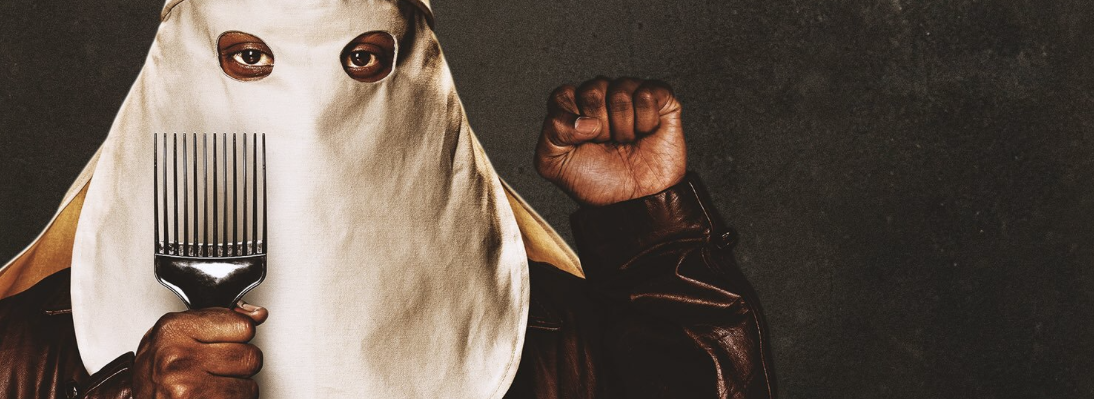Leah Martindale reviews Spike Lee's tour de force 'BlacKkKlansman'; hailed by certain outlets as his seminal piece.
While this seems an overstatement, BlackKklansman as a work screams Lee throughout and is a poignant and relevant portrayal of a near 40 year old true story of the first black officer in the Colorado Springs police department, who successfully infiltrated the Klu Klux Klan. From here on out the review contains spoilers - you've been fairly warned.
The film opens with a remake of the iconic and breathtaking scene from Gone With the Wind (1939), when Scarlett forges through seas of wounded civil war soldiers to find a doctor to deliver Melanie's baby, ending on a shot of the confederate flag drifting in the wind. (The film is later referenced by KKK Grand Wizard David Duke, who refers to his own 'mammy' as being like Hattie McDaniel.) Then it cuts to Alec Baldwin, as Dr Kennebrew Beauregard, spewing racist rhetoric for a public service announcement on the pervasiveness of integration and the destruction of the pure white race, but he keeps forgetting his lines. The tone is instantly set for a rollercoaster ride of racial vitriol, punchy comedy, and heartbreaking social introspection.
John David Washington is Detective Ron Stallworth in an intricate role that is sometimes underplayed. The internal conflict of being a 'jive-loving soul brotha' and a detective in the overtly racist police force is portrayed masterfully by Lee's direction and the team's writing, but Washington's characterisation can at times fall flat. The complexity undertaken in the role of Stallworth is a mammoth task that could intimidate any actor, and while Washington portrays it satisfactorily, it needs more nuance at times.
Adam Driver plays Detective Flip Zimmerman, the white (Jewish) face of Stallworth, with finesse. The character is, simply put, precise. Flip's disdain for the Klansmen, confliction with the cause, and position as a detached employee are shown measuredly throughout the film. He is a man shaped by his time and context, and his character develops steadily with the crazy circumstances, and Driver has the talent to be near imperceptible throughout.
BlackKlansman time aka time for the new film starring one of my very favs pic.twitter.com/WKjT5rngwV
— Becca 🐤 (@littlecharmer_) August 31, 2018
Laura Harrier's portrayal of Patrice, the President of the Colorado University's Black Students' Union group, is one of the more rounded supporting actress roles in Lee's works. Her character trajectory is a little predictable, but is nonetheless played exceptionally, and Harrier undertook this pivotal role with confidence and class. Other notable mentions must go to Ryan Eggold, who manages to play a Klansman with such compassion and care for his fellow Klansmen that he manages to be almost likeable.
The entire duration of the film is one held breath, waiting for the traumatising bomb drop that I have come to know and love of Lee's work. Even without knowing his body of work, however, the film ripples with tension throughout, as the sheer absurdity of the situation is sure to catch up with Ron at some point, and the climax could never be a calm one.
The film's resolution is packed full of action, imagery, and poignant reflections of the two extreme ends of the spectrum. An attempted murder of Patrice turns into the accidental murder of three of the Klansmen by one of their own wives, and Ron is savagely beaten by other police officers who do not believe his status as an undercover officer. All his declarations that the police are not as bad as they seem appear more futile with each blow of the baton. All the while, the Klansman's wife screams racial slurs at Ron and encourages the police to arrest him to cover up for her own terroristic actions.
Blackklansman: a film where the police spearhead the fight for black civil rights
— Mattapoisett2137 (@Matt_A_Poissett) August 25, 2018
On so many level one wonders what was going through Spike Lee's head
For more detailed critique, read from people who were actually at Charlottesville
https://t.co/jFNWjg0y8Y
The film then becomes contemporary when the final sequence shows real footage covering the slaughter of Heather Heyer at an alt-right rally in Charlottesville last year, with real life Klansman David Duke praising Trump and calling for a new white age in America.
As I had before seen BlacKkKlansman's ending being hailed as Lee's most explosive and seminal piece, the final act felt underwhelming, and so I say this: Lee's work is complex and deeply political, and this work takes his themes and serves them anew, as always. The film fits with his body of work perfectly and is a must watch for the politically minded amongst us, or simply those with a love for their fellow man, and a hatred of hatred burning in their hearts.
Featured Image: Twitter / @BlackKklansman
What did you think of Spike Lee's latest directing? Let us know:









